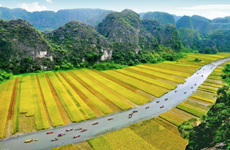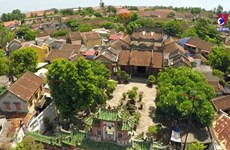Community tourism promoted in Dien Bien
“I was greatly impressed by how unspoilt the mountain was and with the
folk
songs, dances and the food eaten by the Thai ethnic minority people,”
said an
Australian tourist.
“I was greatly impressed by how unspoilt the mountain was and with the folk
songs, dances and the food eaten by the Thai ethnic minority people,” said an
Australian tourist.
Vietnamese-Australian Nguyen Pham Dien gave his first impression of Men hamlet in Thanh Nua village, Dien Bien district, one of the eight sites that promotes community tourism in Dien Bien province. It was started in 2004 to promote the cultural identity of the Thai ethnic minority group.
Tourists are invited into stilt houses and served with sweet bamboo shoots, baked fish and bamboo-tube rice while their hearts are lifted by the melodious folk music. Many admitted that they almost lost their hearts to the beautiful charming Thai girls as they danced and sang so sweetly.
Home-stay programmes are open to anyone who is interested in becoming a member of the Thai community to find out more about their tribal customs and daily lives.
The provincial authorities have said that community based tourism is expected to expand across the province to promote the cultural identities of all the 21 local ethnic minority groups. The programme will also help to increase the local per-capita incomes by around 700,000 VND a month. This is enough to buy a months food in mountainous areas and will contribute greatly to reducing poverty.
Six kilometres away from Dien Bien Phu city, Men hamlet is popular for its superb panoramas and is undergoing changes for the better every day thanks to this kind of tourism.
The headman in Men hamlet, Quang Van Thuong, said that the poverty rate in his hamlet has dropped to five percent from 20 percent in 2004 and all the local families can now afford to send their children to school.
Him Lam commune No.2 on the outskirts of Dien Bien Phu city is another example. Until the tourism programme was launched, the local population largely depended on growing rice and maize on the terraced fields, which lead to a high poverty rate. This tourism scheme has helped the local people to return to brocade weaving to sell to tourists and increase their income.
Nguyen Dang Quang, Vice Director of the provincial Department of Culture, Sports and Tourism, emphasised on the need to educate local people to retain and promote their cultural identity.
The province plans to hold folk song classes for the young generation and restore the local traditional costumes, said Quang.
Local families working in the tourist industry will be sent to Sa Pa mountain resort in the north-western province of Lao Cai as well as Ban Lac tourist site in the northern mountainous province of Hoa Binh to learn from others how to improve the quality of their services, he added.
Several traditional festivals or rituals will also be revived, such as the festival to pray for peace and the ritual of praying for a bumper harvest as it is expected they will appeal to tourists.
The model of community-based culture tourism currently used in Dien Bien has not yet been fully commercialised, so is quite attractive to foreign tourists, said Quang.
The district has welcomed over 115,000 tourists, including 11,000 foreigners, over the past four months, contributing to the province’s target to attract over 300,000 tourists, including 50,000 foreigners, this year.
Dien Bien Phu was the former battlefield that put an end to the Indochina war. Dien Bien district keeps many items from the bunker of French General De Castries, the commander-in-chief of French the Expeditionary Force at the Dien Bien Phu battlefield./.
Vietnamese-Australian Nguyen Pham Dien gave his first impression of Men hamlet in Thanh Nua village, Dien Bien district, one of the eight sites that promotes community tourism in Dien Bien province. It was started in 2004 to promote the cultural identity of the Thai ethnic minority group.
Tourists are invited into stilt houses and served with sweet bamboo shoots, baked fish and bamboo-tube rice while their hearts are lifted by the melodious folk music. Many admitted that they almost lost their hearts to the beautiful charming Thai girls as they danced and sang so sweetly.
Home-stay programmes are open to anyone who is interested in becoming a member of the Thai community to find out more about their tribal customs and daily lives.
The provincial authorities have said that community based tourism is expected to expand across the province to promote the cultural identities of all the 21 local ethnic minority groups. The programme will also help to increase the local per-capita incomes by around 700,000 VND a month. This is enough to buy a months food in mountainous areas and will contribute greatly to reducing poverty.
Six kilometres away from Dien Bien Phu city, Men hamlet is popular for its superb panoramas and is undergoing changes for the better every day thanks to this kind of tourism.
The headman in Men hamlet, Quang Van Thuong, said that the poverty rate in his hamlet has dropped to five percent from 20 percent in 2004 and all the local families can now afford to send their children to school.
Him Lam commune No.2 on the outskirts of Dien Bien Phu city is another example. Until the tourism programme was launched, the local population largely depended on growing rice and maize on the terraced fields, which lead to a high poverty rate. This tourism scheme has helped the local people to return to brocade weaving to sell to tourists and increase their income.
Nguyen Dang Quang, Vice Director of the provincial Department of Culture, Sports and Tourism, emphasised on the need to educate local people to retain and promote their cultural identity.
The province plans to hold folk song classes for the young generation and restore the local traditional costumes, said Quang.
Local families working in the tourist industry will be sent to Sa Pa mountain resort in the north-western province of Lao Cai as well as Ban Lac tourist site in the northern mountainous province of Hoa Binh to learn from others how to improve the quality of their services, he added.
Several traditional festivals or rituals will also be revived, such as the festival to pray for peace and the ritual of praying for a bumper harvest as it is expected they will appeal to tourists.
The model of community-based culture tourism currently used in Dien Bien has not yet been fully commercialised, so is quite attractive to foreign tourists, said Quang.
The district has welcomed over 115,000 tourists, including 11,000 foreigners, over the past four months, contributing to the province’s target to attract over 300,000 tourists, including 50,000 foreigners, this year.
Dien Bien Phu was the former battlefield that put an end to the Indochina war. Dien Bien district keeps many items from the bunker of French General De Castries, the commander-in-chief of French the Expeditionary Force at the Dien Bien Phu battlefield./.













